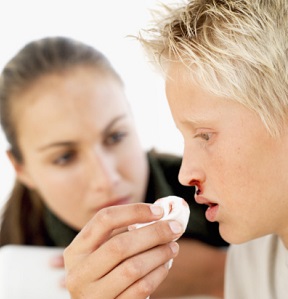 Although perhaps scary, nosebleeds are common and rarely indicate a serious medical problem. There are many blood vessels in the nose that are close to the surface, which are quite fragile and easily bleed. Nosebleeds are commonly seen in adults and children between the ages of 3 and 10. There are 2 types of nosebleeds - an anterior nosebleed happening when the front blood vessels break and bleed, while a posterior nosebleed happening in the deepest part or back of the nose.
Although perhaps scary, nosebleeds are common and rarely indicate a serious medical problem. There are many blood vessels in the nose that are close to the surface, which are quite fragile and easily bleed. Nosebleeds are commonly seen in adults and children between the ages of 3 and 10. There are 2 types of nosebleeds - an anterior nosebleed happening when the front blood vessels break and bleed, while a posterior nosebleed happening in the deepest part or back of the nose.
What Causes Nosebleeds?
Most commonly, frequent nosebleeds happen at the front of the nose. Common nose bleed causes include:
- Structural problems, either from birth or caused by injury
- Picking or blowing the nose
- Low humidity
- Minor health issues like allergies or colds, causing irritation and swelling in the nose and even spontaneous bleeding
- Minor nose injuries
- Medicines. Be careful with these and always follow all instructions when taking the following medications:
– Warfarin, aspirin, enoxaparin, clopidogrel, or nonsteroidal anti-inflammatory drugs.
– Decongestants, antihistamines and medicated nasal sprays which dry the tissue of the sinuses and nose.
Nosebleeds which are recurring can also be caused by:
- Abnormal growth, a polyp or tumor, in the sinuses or nose
- Blood vessels very close to surface of nose lining being ruptured
- A health condition which affects blood clotting
- Blood vessel which are abnormal, like with Osler-Weber-Rendu syndrome, which is inherited and make it difficult to keep nosebleed under control.
- Trauma such as putting things into the nose, blowing too hard or hitting it with a ball or other objects.
- Residing in a dry climate and using central heating can dry out the nasal membranes and tissues. If they are picked or scratched, the nose can bleed.
How to Deal With Frequent Nosebleeds
Frequent nosebleeds can cause light-headedness, dizziness, fainting and confusion. Therefore it is important to learn how to treat frequent nosebleeds. Many still try leaning back, pinching the bridge of the nose, putting ice on the bride of the nose or just letting it bleed until it stops on its own. With these steps, however, it isn’t uncommon to see the nosebleed last for 45 minutes or more.
With your next nosebleed, you’ll have better luck if you try:
- Lean forward, as leaning back could lead to swallowing the blood, making you cough or choke.
- Squeeze the soft part or tip of your nose, right under the bony part, so that your nostrils are closed. This can be done with a tissue, your finger or a washcloth, and it will let the blood pool in the nose clot faster. It will also stop it from pouring out.
- Keep squeezing your nose for 5 to 10 minutes and try not to check it too often to see if it's still bleeding. After the 5 or 10 minutes, when you do release pressure, if it is continuing to bleed hold your nose an additional 5 to 10 minutes.
- Call your doctor if it keeps bleeding after several cycles of this.
- Even though putting an ice pack on your nose alone won’t work, you can use it with the above steps to help it stop the bleeding sooner.
- It is also important to avoid blow your nose after a nosebleed. If the clot is blown out of your nose, it will probably bleed again. Leaving the clot in your nose to give the nasal blood vessels time to heal.
If you want to know how to deal with nosebleeds weather it's due to a trauma or not, check out the video below:
When to See a Doctor
Most nosebleeds, even frequent nosebleeds, are not serious and will stop on their own or by taking steps of your own to stop it. But seek professional care from your doctor if your nosebleed:
- Is making it difficult to breathe
- Involves a lot more blood than expected
- Will not stop after 30 minutes, even with compression
- Happens after an injury, like a car accident
Do not drive yourself to the emergency room if there is a lot of blood loss. Call 911 or a local emergency number so someone else can drive you.
Speak with your doctor if you are experiencing frequent nosebleeds, even if they can be stopped pretty easily. You need to figure out what cause it in the first place.
How to Prevent Nosebleeds
There are several things you can do to prevent nosebleeds in the future, including:
- Avoid picking your nose. If you must do so, make sure to trim your nails to avoid any injury;
- Use a humidifier in your home so the air remains moist;
- Limit your aspirin intake, as this can thin your blood and cause more nosebleeds;
- Use decongestants and antihistamines in moderation;
- Don’t smoke, as this contributes to nasal irritation and dryness;
- If the nosebleeds are related to another medical condition like a chronic sinus condition or liver disease, follow the advice of your doctor to keep the problem controlled;
- If your child has frequent nosebleeds, speak to your pediatrician about saline nose drops for daily use. This can be helpful if you live in a climate which is very dry or when the heat is on in your home.